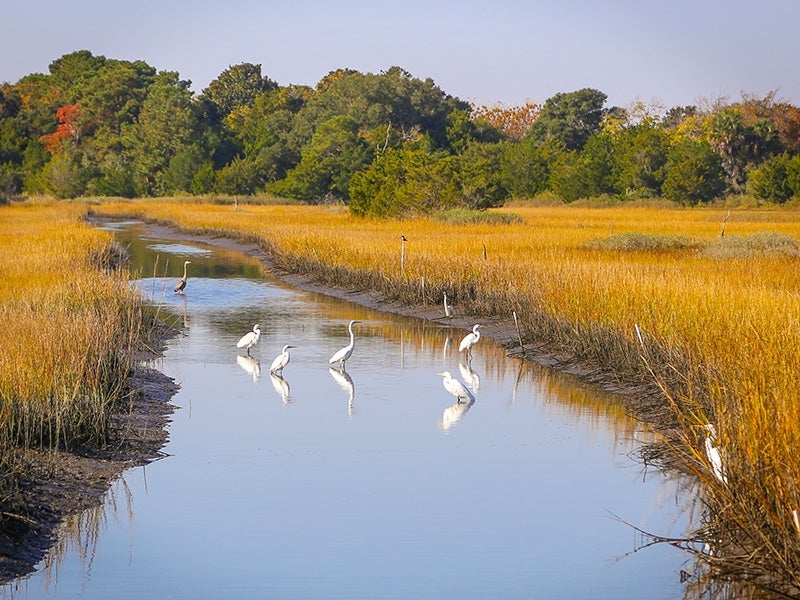Earthjustice goes to court for our planet.
We’re here because the earth needs a good lawyer.
Biden Strengthens Protections for Thousands of Nation’s Waterways
This page was published 3 years ago. Find the latest on Earthjustice’s work.
In a victory for clean wetlands, rivers, streams, and drinking water in the United States, the Biden administration announced that is expanding and strengthening protections for U.S. waterways under the Clean Water Act.
The U.S. Environmental Protection Agency (EPA) issued a new rule defining which national waters are protected by law after Earthjustice successfully challenged a Trump-era rule that left thousands of waterbodies unprotected.
But the fight isn’t over. Earthjustice is watching the Sackett v EPA Supreme Court case that could disrupt this progress for the nation’s waters by gutting the historic Clean Waters Act, and we’re prepared to fight back if this happens.
Biden’s new Waters of the United States (WOTUS) Rule will expand protections for the nation’s waters through updates to the Clean Water Act.
- The U.S. EPA and U.S. Army Corps of Engineers just issued a final rule that identifies and expands which waters are protected under the Clean Water Act as “waters of the United States” (or “WOTUS”).
- The Clean Water Act was enacted in 1972, giving the EPA and Army Corps the authority and responsibility to protect all the “waters of the United States,” and to restore and maintain the chemical, physical, and biological integrity of our waters.
- The Biden administration’s new rule reinstates protections to ensure big polluters can be stopped from recklessly bulldozing our wetlands and dumping waste into our streams.
- By finalizing this rule, the Biden administration has issued a final blow to former President Donald Trump’s Navigable Waters Protection Rule, (dubbed by many as the “Dirty Water Rule”), which rolled back clean water protections and allowed hundreds of damaging development projects to move forward resulting in degraded waterways that feed into our rivers, lakes, and drinking water sources.
We’ve been fighting to protect our nation’s waters for years.
- The new rule comes after Earthjustice filed two lawsuits on behalf of tribes and environmental organizations to challenge the Trump administration’s clean water rule rollback.
- Although the Trump administration’s rule was in effect for over a year, jeopardizing the waterways that our families and communities depend on, Earthjustice won a lawsuit in 2021 that stopped the Trump-era rule and minimized damage done to waterways before a new rule could be finalized.
The EPA is following science and public opinion.
- The new WOTUS rule is based on vigorous science.
- The agencies that made the new rule reviewed hundreds of scientific articles when making this rule and worked through thousands of public comments to develop a framework for protecting our nation’s waters from industrial pollution.
- The rule is not perfect, but it is a crucial step toward restoring protection to a network of waterways that support healthy ecosystems, and economies.
- More than three in four people support stronger federal protections for our nation’s waters.
We’re still watching Sackett v EPA—a case that could gut the Clean Water Act.
- The Supreme Court is considering a case this term called Sackett v EPA, which also examines which waters are protected by the Clean Water Act and may change the legal foundation of the new rule protecting our national waters.
- In the case, the plaintiffs (Sackett) are challenging the applicability of the Clean Water Act to thousands of wetlands.
- If the court sides with the plaintiffs, it will dramatically reduce the number of wetlands and streams protected by the Clean Water Act.
- Earthjustice filed an amicus brief to the Supreme Court in June on behalf of Native tribes seeking to defend existing water protections for the waterways they rely on for food, economy, and culture.
- We expect the Supreme Court to issue its decision in early 2023 and will continue fighting to uphold and strengthen the Clean Water Act.
This fight is not over yet.
- The Biden administration, Congress, and states must continue to do more to protect clean water.
- Too many communities, particularly Indigenous communities, communities of color, and low wealth communities, still lack clean water.
- Our country must continue siding with people over polluters and work to ensure everyone, no matter their race, ZIP code, or income, has access to clean water.
